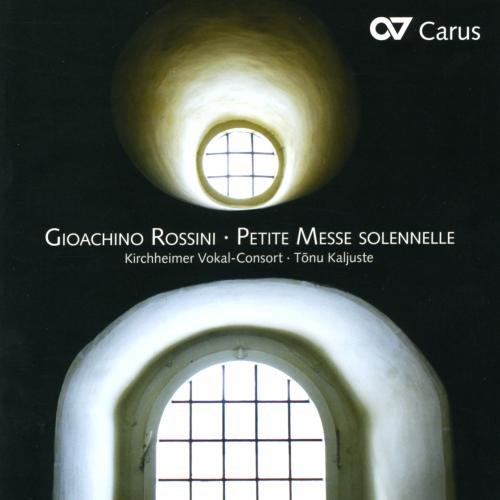ROSSINI Petite Messe solennelle
Rossini’s Mass with the eight voices it demands
View record and artist detailsRecord and Artist Details
Composer or Director: Gioachino Rossini
Genre:
Vocal
Label: Carus
Magazine Review Date: AW13
Media Format: CD or Download
Media Runtime: 78
Mastering:
DDD
Catalogue Number: CARUS83 406

Tracks:
| Composition | Artist Credit |
|---|---|
| Petite messe solennelle |
Gioachino Rossini, Composer
Andrea Lauren Brown, Soprano Andreas Grasle, Harmonium Dominik Wörner, Bass Georg Poplutz, Tenor Gioachino Rossini, Composer Jonathan de la Paz Zaens, Bass Michael Feyfar, Tenor Sarah Wegener, Soprano Simon Bucher, Piano Tõnu Kaljuste, Conductor Ulrike Andersen, Alto Ulrike Bartsch, Alto |
Author: Richard Osborne
Rossini wrote the Messe for an eight-voice chorus. Any performance which uses more is dead in the water. The Kirchheimer Vokal-Consort deploys a double quartet which catches well the limpidity and piquancy of Rossini’s vocal writing, its courtly ease of utterance and its rigour. Director Tõnu Kaljuste’s forward-pressing tempi provide an element of urgency that acts both viscerally and spiritually. The Rossinian sense of joy is palpable yet the performance also etches in that undertow of anguish (‘There is more faith in honest doubt’, as Rossini’s contemporary Tennyson put it) which underpins long sections of the Messe. The drive of pianist Simon Bucher, along with his sensitivity as an accompanist and his exquisite rendering of the ‘Prélude religieux’, are also integral to the performance’s success. I cannot recall this aspect of the work being better realised, even by Sawallisch.
Rossini set posterity a problem by writing powerful but intimate solo numbers for four of the Paris Opéra’s finest young voices. Sawallisch’s LP- and TV-funded recording was able to deploy a near-perfect quartet. The new performance draws its soloists from within the vocal octet, a high-risk strategy which is not unsuccessful in practice. The only (predictable) stumbling blocks are the tenor air ‘Domine Deus’, which Rossini wrote for the supremely elegant Italo Gardoni, a celebrated Comte Ory, and the ‘Quoniam’, which he wrote for the great Belgian bass Luigi Agnesi. Elsewhere the solo work is sensitive and assured, often fine. The mezzo Ulrike Andersen is superb in the concluding ‘Agnus Dei’, where the superlative Carus recording places the attendant choral septet at a distance that is as haunting as it is discreet.
Discover the world's largest classical music catalogue with Presto Music.

Gramophone Digital Club
- Digital Edition
- Digital Archive
- Reviews Database
- Full website access
From £8.75 / month
Subscribe
Gramophone Full Club
- Print Edition
- Digital Edition
- Digital Archive
- Reviews Database
- Full website access
From £11.00 / month
Subscribe
If you are a library, university or other organisation that would be interested in an institutional subscription to Gramophone please click here for further information.




